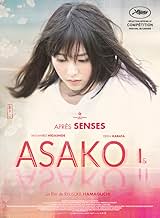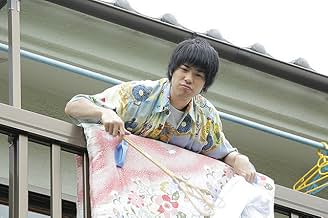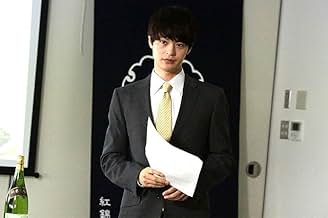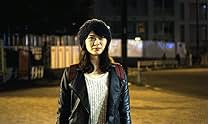CALIFICACIÓN DE IMDb
7.1/10
5.8 k
TU CALIFICACIÓN
Asako vive en Osaka y está enamorada de Baku, un espíritu libre que un día desaparece repentinamente. Dos años más tarde, en Tokyo, Asako conoce a Ryohei, que a pesar de ser igualito a Baky ... Leer todoAsako vive en Osaka y está enamorada de Baku, un espíritu libre que un día desaparece repentinamente. Dos años más tarde, en Tokyo, Asako conoce a Ryohei, que a pesar de ser igualito a Baky tiene una personalidad muy distinta.Asako vive en Osaka y está enamorada de Baku, un espíritu libre que un día desaparece repentinamente. Dos años más tarde, en Tokyo, Asako conoce a Ryohei, que a pesar de ser igualito a Baky tiene una personalidad muy distinta.
- Dirección
- Guionistas
- Elenco
- Premios
- 3 premios ganados y 10 nominaciones en total
- Dirección
- Guionistas
- Todo el elenco y el equipo
- Producción, taquilla y más en IMDbPro
Opiniones destacadas
Interesting premise, but flat characters making infuriating decisions made this one tough to fully appreciate. It's a film that had its moments in the interplay between the friends, but felt too simplistic at the core of its love triangle, and dragged on too long. I liked the idea of exploring the compromises usually necessary in a stable relationship vs. The wild ride our hearts might lead us on, but this didn't feel much like an exploration, perhaps because the central character (Erika Karata) is so weakly drawn.
Maybe if you've been left in the past by a partner you truly loved, someone who if they showed up out of the blue might cause you to throw everything that's good in your life away, it may resonate more for you, but for me I couldn't buy it. Solid performance from Masahiro Higashide in the dual role, and I liked the character of Maya (Rio Yamashita) here - if only her fate had been a little more intertwined with that of Ryohei's.
Maybe if you've been left in the past by a partner you truly loved, someone who if they showed up out of the blue might cause you to throw everything that's good in your life away, it may resonate more for you, but for me I couldn't buy it. Solid performance from Masahiro Higashide in the dual role, and I liked the character of Maya (Rio Yamashita) here - if only her fate had been a little more intertwined with that of Ryohei's.
The main character doesn't seem like a real person. Towards the end of the movie, her actions are wrenching for everyone. Unfortunately, there doesn't seem to any particular reason for them.
Other than this, the movie can be boring. There's no reason it could not have been 90 minutes instead of two hours.
Earlier in the movie there was an awkward scene at a party that I could have done without.
I've seen hundreds of Japanese movies. Too often they are depressing and/or harrowing. Lately, opaque characters who are randomly destructive are cropping up.
WARNING: If you do see this movie at a theater, it looks like it might have no previews and starts right on time.
Other than this, the movie can be boring. There's no reason it could not have been 90 minutes instead of two hours.
Earlier in the movie there was an awkward scene at a party that I could have done without.
I've seen hundreds of Japanese movies. Too often they are depressing and/or harrowing. Lately, opaque characters who are randomly destructive are cropping up.
WARNING: If you do see this movie at a theater, it looks like it might have no previews and starts right on time.
The opening scenes reflect the rest of the movie, simultaneously very down-to-earth and readily truculent, resulting in a mix of stark still shots (very well composed) allied to a mise-en-scène that's quite surprising at times. The resolution of the final twist continues after a stylized seascape that could have been the start of the end credits, and offers a sequel to the events in a way that is as concrete and plausible as it is tender. This dichotomy between slice-of-life narration and impromptu events is at the heart of the story, and many parallels can be drawn with this same dynamic:
The actors are all very convincing, the friendships are powerful and the dialogue well-written. Although I'm not bothered by Asako's character, as she seems to me to stem more from the Japanese archetype of an irrepressibly shy, diaphanous woman who can nonetheless demonstrate unsuspected strength, it's undeniable that she's not entirely compelling enough to carry the story; her few unpredictable antics are interesting, but when she's in her more mute state, the actress struggles to convince that she's in the grip of Cornelian torments in her innermost being. Her characterization is too disjointed in general, and not by design.
The balance isn't perfect, the romantic relationships are rather conventional (Baku is almost non-existent for most of the film and is devoid of the slightest personality) and we're often far more interested in seeing the lives of the secondary characters. Perhaps a slight overindulgence in unexpected scenes takes precedence over the coherence of the narrative. A fine job with the atmosphere, though. Decent soundtrack, unconvincing out of context.
Very keen on seeing what else Hamaguchi has up his sleeve.
- the two identical men in Asako's life,
- Tokyo and Osaka,
- water and its inopportune rain, the earth and its powerful quakes,
- Asako in contrast to her two much more outgoing and vivacious friends,
- insane freedom, liberating but destructive compared to stability and deep love built over the long term.
The actors are all very convincing, the friendships are powerful and the dialogue well-written. Although I'm not bothered by Asako's character, as she seems to me to stem more from the Japanese archetype of an irrepressibly shy, diaphanous woman who can nonetheless demonstrate unsuspected strength, it's undeniable that she's not entirely compelling enough to carry the story; her few unpredictable antics are interesting, but when she's in her more mute state, the actress struggles to convince that she's in the grip of Cornelian torments in her innermost being. Her characterization is too disjointed in general, and not by design.
The balance isn't perfect, the romantic relationships are rather conventional (Baku is almost non-existent for most of the film and is devoid of the slightest personality) and we're often far more interested in seeing the lives of the secondary characters. Perhaps a slight overindulgence in unexpected scenes takes precedence over the coherence of the narrative. A fine job with the atmosphere, though. Decent soundtrack, unconvincing out of context.
Very keen on seeing what else Hamaguchi has up his sleeve.
Emergent Japanese filmmaker Ryûsuke Hamaguchi, after his international breakthrough HAPPY HOUR (2015), is welcomed to Cannes' main competition for its follow up ASAKO I & II, an adaptation of Tomoka Shibasaki's 2010 novel.
The story traces a threadbare template of a young woman Asako's (newcomer Karata in her first film) internal struggle between two men Bako and Ryohei (both played by Higashide), who look just like each other but equipped with polarized personalities. After a prologue setting in Osaka, delineates the evanescent passion between Asako and Bako, the meat of the story relocates Asako to Tokyo, two years after Bako vanishes from her life apropos of nothing, she works in a coffee shop and bumps into Ryohei, a sake company salaryman with an uncanny resemblance of Bako, only, Ryohei turns out to be a gregarious, straight-arrow type that is nothing similar to Bako's enigmatic, ethereal insouciance.
Initially shocked to her core, Asako is gradually won over by many virtues Ryohei exhibits and after a tentative consent of his courtship, their wavering commitment is significantly cemented by the Great East Japan Earthquake in 2011, 6 years later, the present day, they are still together and Asako truly grows into a deeper affection to Ryohei, but a reunion with Hayuro (Itô), her best friend in Osaka, augurs the ineluctable re-entry of Bako, now a celebrated heartthrob, into her life, just after she comes clean her relationship with Bako to Ryohei (who confesses that he has divined a thing or two in the past years) and gallantly waves adieu to that seemingly closed chapter in the life, when the crunch comes, her impulsive reaction betrays the complexity of her id, after a dreamlike nocturnal driving on the highway with her knight in shining armor, she comes to a sudden awakening, and has a daunting job to win over Ryohei's heart again, or maybe not, Hamaguchi imbues a realistic spin in their final shot, both looking right into the camera to their indeterminate future.
Conceptually and thematically evoking Ozon's DOUBLE LOVER (2017), plus as its English title reveals, ASAKO I & II, Hamaguchi's conceit actually zooms in on Asako's dual oscillation (the idealized versus the realistic version of her affection) rather than on his literally doubled male protagonists, but through Karata's passive gaze, quiet performance and greenness, that oscillation is all to well buried underneath whereas Higashide lights up the screen with his compassionate incarnation of an ultimate good guy unfairly taking the short end of the stick in their lopsided relationship, thus the twofold revelations come off as a shade over-dramatic albeit Hamaguchi proves to be a superlative raconteur, it is not an easy job to weave a banal love triangle into an organic entity of compelling watching, and somehow, he manages that with great distinction, especially by conducting a tooth-comb of the narrative arc through supporting characters.
Apart from his gazing-at-the-lens MO (Asako, first meets Bako, then with Royhei in two Shigeo Gocho's SELF AND OTHERS exhibitions, tacitly carries off the parallels), Hamaguchi also struts his stuff with an aptitude with lights and scenic composition, betokened by the gradation of sunlight shadowing the rain-dappled field in the aerial shot near the end. All in all, ASAKO I & II is an auspicious discovery of a new Japanese auteur in the vein of Hirokazu Koreeda and Naomi Kawase, that is something every cineaste should extol!
The story traces a threadbare template of a young woman Asako's (newcomer Karata in her first film) internal struggle between two men Bako and Ryohei (both played by Higashide), who look just like each other but equipped with polarized personalities. After a prologue setting in Osaka, delineates the evanescent passion between Asako and Bako, the meat of the story relocates Asako to Tokyo, two years after Bako vanishes from her life apropos of nothing, she works in a coffee shop and bumps into Ryohei, a sake company salaryman with an uncanny resemblance of Bako, only, Ryohei turns out to be a gregarious, straight-arrow type that is nothing similar to Bako's enigmatic, ethereal insouciance.
Initially shocked to her core, Asako is gradually won over by many virtues Ryohei exhibits and after a tentative consent of his courtship, their wavering commitment is significantly cemented by the Great East Japan Earthquake in 2011, 6 years later, the present day, they are still together and Asako truly grows into a deeper affection to Ryohei, but a reunion with Hayuro (Itô), her best friend in Osaka, augurs the ineluctable re-entry of Bako, now a celebrated heartthrob, into her life, just after she comes clean her relationship with Bako to Ryohei (who confesses that he has divined a thing or two in the past years) and gallantly waves adieu to that seemingly closed chapter in the life, when the crunch comes, her impulsive reaction betrays the complexity of her id, after a dreamlike nocturnal driving on the highway with her knight in shining armor, she comes to a sudden awakening, and has a daunting job to win over Ryohei's heart again, or maybe not, Hamaguchi imbues a realistic spin in their final shot, both looking right into the camera to their indeterminate future.
Conceptually and thematically evoking Ozon's DOUBLE LOVER (2017), plus as its English title reveals, ASAKO I & II, Hamaguchi's conceit actually zooms in on Asako's dual oscillation (the idealized versus the realistic version of her affection) rather than on his literally doubled male protagonists, but through Karata's passive gaze, quiet performance and greenness, that oscillation is all to well buried underneath whereas Higashide lights up the screen with his compassionate incarnation of an ultimate good guy unfairly taking the short end of the stick in their lopsided relationship, thus the twofold revelations come off as a shade over-dramatic albeit Hamaguchi proves to be a superlative raconteur, it is not an easy job to weave a banal love triangle into an organic entity of compelling watching, and somehow, he manages that with great distinction, especially by conducting a tooth-comb of the narrative arc through supporting characters.
Apart from his gazing-at-the-lens MO (Asako, first meets Bako, then with Royhei in two Shigeo Gocho's SELF AND OTHERS exhibitions, tacitly carries off the parallels), Hamaguchi also struts his stuff with an aptitude with lights and scenic composition, betokened by the gradation of sunlight shadowing the rain-dappled field in the aerial shot near the end. All in all, ASAKO I & II is an auspicious discovery of a new Japanese auteur in the vein of Hirokazu Koreeda and Naomi Kawase, that is something every cineaste should extol!
Asako falls in love with Baku, and they live an intense love, until he disappears without a trace. Years later, Asako meets Ryohei, who looks exactly like Baku. I usually like this kind of tragic romance, however, Asako I & II is not consistent enough to leave a mark. The main character, Asako, is very superficial throughout the film, with attitudes that disconnect her from real life events, making hard to the viewer to bond with her. If the goal was to address the moving on issue in relations, and seeing true love through different perspectives, it fails completely. The best that comes out of the film is Masahiro Higashide, who plays both roles (Baku and Ryohei) very competently.
¿Sabías que…?
- TriviaThe first commercially produced film directed by Ryûsuke Hamaguchi.
- ConexionesFeatured in Fandor: Cannes You Dig It? | Fandor Spotlight (2022)
Selecciones populares
Inicia sesión para calificar y agrega a la lista de videos para obtener recomendaciones personalizadas
- How long is Asako I & II?Con tecnología de Alexa
Detalles
- Fecha de lanzamiento
- Países de origen
- Sitios oficiales
- Idiomas
- También se conoce como
- Asako I & II
- Locaciones de filmación
- Productoras
- Ver más créditos de la compañía en IMDbPro
Taquilla
- Total en EE. UU. y Canadá
- USD 25,559
- Fin de semana de estreno en EE. UU. y Canadá
- USD 5,690
- 19 may 2019
- Total a nivel mundial
- USD 645,313
- Tiempo de ejecución1 hora 59 minutos
- Color
- Relación de aspecto
- 1.66 : 1
Contribuir a esta página
Sugiere una edición o agrega el contenido que falta

Principales brechas de datos
What is the Brazilian Portuguese language plot outline for Netemo sametemo (2018)?
Responda





















